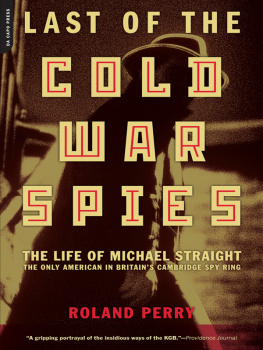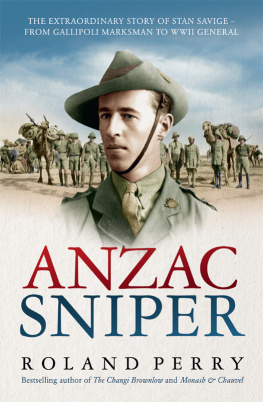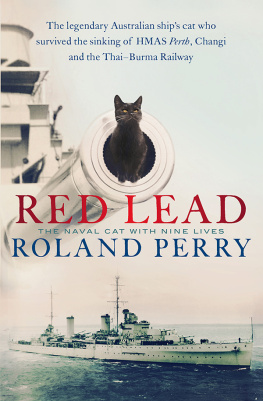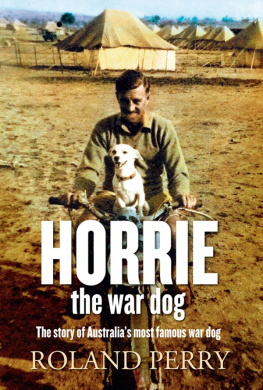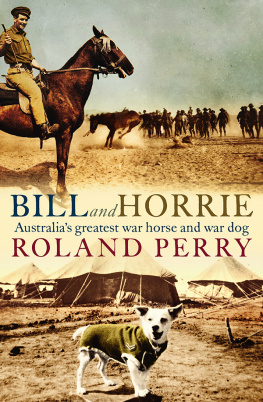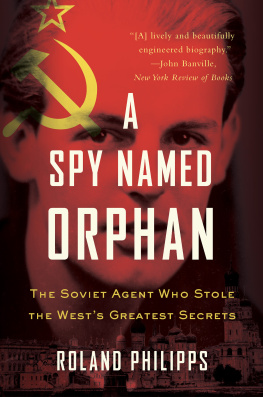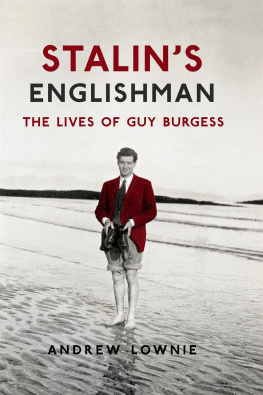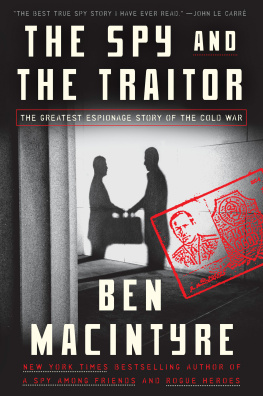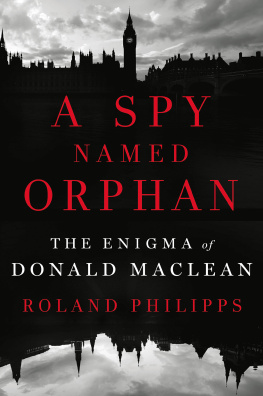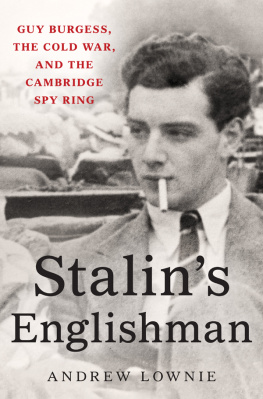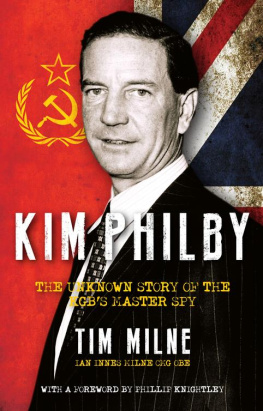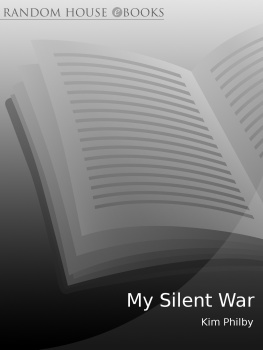LAST OF THE
COLD WAR SPIES
ALSO BY ROLAND PERRY
Non-Fiction
The Fifth Man
Hidden Power: The Programming of the President
Monash: The Outsider Who Won a War
The Exile: Wilfred Burchett, Reporter of Conflict
Mel Gibson: Actor, Director, Producer
Lethal Hero
Elections Sur Ordinateur
Millers Luck: The Life and Loves of Crickets Cavalier
Bradmans Best
Bradmans Best Ashes Teams
The Don
Captain Australia: A History of the Celebrated Captains of Test Cricket
Bold Warnie
Waughs Way
Shane Warne: Master Spinner
Fiction
Program for a Puppet
Blood Is a Stranger
Faces in the Rain
LAST OF THE
COLD WAR SPIES
THE LIFE OF MICHAEL STRAIGHT
THE ONLY AMERICAN IN BRITAINS CAMBRIDGE SPY RING
ROLAND PERRY
Copyright 2005 by Roland Perry
All rights reserved. No part of this publication may be reproduced, stored in a retrieval system, or transmitted, in any form or by any means, electronic, mechanical, photocopying, recording, or otherwise, without the prior written permission of the publisher. Printed in the United States of America.
Designed by Trish Wilkinson
Set in 11.5-point Adobe Garamond
Library of Congress Cataloging-in-Publication Data
Perry, Roland
Last of the Cold War spies : the life of Michael Straightthe only American in Britains
Cambridge spy ring / Roland Perry. 1st Da Capo Press ed.
p. cm.
Includes bibliographical references (p. ) and index.
ISBN 0-306-81428-5 (alk. paper)
eBook ISBN: 9780786741243
1. Straight, Michael Whitney. 2. Espionage, SovietGreat BritainHistory.
3. SpiesUnited StatesBiography. 4. SpiesGreat BritainBiography. I. Title.
UB271.R92S76 2005
327.1247073'092dc22
2005004790
First Da Capo Press edition 2005
Published by Da Capo Press
A Member of the Perseus Books Group
http://www.dacapopress.com
Da Capo Press books are available at special discounts for bulk purchases in the U.S. by corporations, institutions, and other organizations. For more information, please contact the Special Markets Department at the Perseus Books Group, 11 Cambridge Center, Cambridge, MA 02142, or call (800) 255-1514 or (617) 252-5298, or e-mail special.markets@perseusbooks.com.
1 2 3 4 5 6 7 8 908 07 06 05
TO THE MEMORY OF
DOROTHY WHITNEY ELMHIRST
PREFACE
D espite Michael Straights 1963 confession to the FBI that his covert KGB activity ceased in 1942, there is much material to establish otherwise, and FBI files (based mainly on the agencys interrogation of him), the MI5 and CIA files, and testimony from others, as well as his own actions, tell a different story. Straights own Apologia demonstrates his thirty-year effort to cover up first his secret recruitment by the KGB and then his continuing secret activity. It also explains some of the forces that directed this intellectually gifted, fiercely ambitious American.
Friends, enemies, and close family members and their diaries provided far more revealing details of how others saw this important figure in their lives. Further information and observations came from interviews with people who knew Straight while they were employed by the KGB, CIA, FBI, MI6, and MI5. They confirmed his activities and his character. Many other sources were helpful, including the NSA (Venona), FBI, CIA, United States State Department, and British intelligence files. Transcripts from the House Un-American Activities Committee, the U.S. Senate, and other hearings were more than useful, as was the Dartington Hall archival material.
The recent release of Straight-related KGB files, generally submitted as summaries, was carefully orchestrated to be in line with what was already known about Straights work as a KGB agent. But Last of the Cold WarSpies reveals how Michael Straight was present at many of the important events and places at the heart of the Cold War. On every occasion and in every place he was on a KGB assignment. This distinguishes Last of theCold War Spies from the plethora of books that were published on both sides of the Atlantic after the collapse of Communism. Many espionage writers rushed for Moscow gold and collaborated with KGB agents to create works that were dependent on what was supplied by Russian intelligence. These writers produced millions of words, yet next to nothing that was memorable or revealing. The KGB and its successor were always in control of what came out of their archives. No significant information was made public that Western intelligence didnt already know. The mass of disinformation generated was a gigantic KGB con. Last of the Cold WarSpies was not written in collaboration with a former KGB operative. Although the book references KGB archive material, it keeps it in proper perspective as representing the view of Russian intelligence, which continues to deceive the West fifteen years after the collapse of Communism.
Roland Perry
Australia 2005
LAST OF THE
COLD WAR SPIES
INTRODUCTION
M ichael Whitney Straight was always going to be different from the rest of the Cambridge University ring of spies recruited by Russian intelligence in the 1930s. First, he was the only American among a group otherwise boasting British backgrounds. Second, he was the wealthiest. And third, he was the most ambitious. He wanted to succeed at something other than being a thief and errand boy for Joseph Stalin. Most of the others in the ring were dedicated wholly to a life of espionage work. To say the others were motivated by ideology is not enough. Once the Stalinist brand of Marxism was exposed as a fraud, many were disillusioned but still carried on.
Kim Philby suggested he only ever wanted to be a spy, which indicated a mind excited by the thrill of deception. His thrill turned sour when he defected to Russia, where his bosses shunned him. The rejection turned him suicidal and exacerbated his alcoholism.
Guy Burgesss KGB-admired capacity for imaginative lying and scheming was cut short by his own whimsical decision to defect with Donald Maclean in 1951. Burgess hated his life in Russia and died in miserable conditions in 1963.
Donald Maclean, like Kim Philby, took his Soviet agency seriously all his life. He carried on his work in Russia long after defecting. Although he was motivated by ideology, from all accounts he had a sad life in Russia despite never regretting his spying.
John Cairncross, the brilliant, impoverished Scotsman, became an expert on the French writer Molire. While more proud of his profound undercover work for the KGB, especially with the Battle of the Kursk, which helped change the course of World War II, Cairncross was happy to be acknowledged for his academic success. He was blown as a spy in 1951.
Victor Rothschild spread his tentacles everywhere on behalf of British, Israeli, and Soviet intelligence and put his prodigious intellectual capacities across several disciplines. At the beginning his support for the Soviet Union was rooted in self-preservation and the practical realities of prewar Europe. The Rothschild family had been a target for Hitler and the Nazis in every country they occupied. Postwar, his reasons were more murky. Like his forebears who had considerable influence in Europe in the nineteenth century, Rothschild thrived on secrecy, subterfuge, and behind the-scenes machinations. He was happy in the back rooms of power manipulating events to achieve success for his nefarious projects.
Anthony Blunts espionage work was marginalized after the defection of Burgess and Maclean, although he still on occasion met with his Soviet control, Yuri Modin. He had another, more visible career as the royal art curator and competent lecturer and writer of turgid art books. Like Rothschild, he thrived out of the limelight, in the hidden world of the palace and the esoteric world of art academia.

